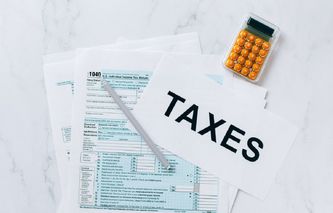While the single most important day of the tax season is April 15, there are a number of important dates to consider each year. A tax calendar is a handy reference document, which can help all taxpayers avoid both penalties as well as late fees.
In this article, we're going to provide a tax calendar that outlines most of the important dates taxpayers should be aware of each year. Instead of providing one large chronological outline of all these dates, we're going to break the timelines down into smaller groups. These groupings include those associated with estimated taxes, e-file deadlines, dates associated with filing tax returns, as well as contributions to retirement plans.
Important Income Tax Dates
As the saying goes, one of the certain things in life is taxes. Awareness of certain due dates will help individuals to avoid penalties. Instead of publishing a calendar for specific tax years, like 2020 or 2021, the approach here is to summarize important dates, along with the appropriate deadline "rules." In this manner, the exact dates can be determined for any calendar year.
In the sections below, we're going to summarize dates that pertain to the following:
Tax Returns and Extensions
Payment of Estimated Taxes
Retirement Accounts
Internal Revenue Service's (IRS) e-file Tax Return Filing System
Employees Working for Tips
Tax Return Calendar
This first set of dates summarizes the IRS requirement for filing tax returns, Form 4868 (extensions), and the payment of estimated federal income taxes.
Date | Description |
January 1 | First day of the new tax calendar |
January 15 | Fourth quarter estimated taxes are due |
February 2 | 1099, 1098, and W-2 forms should have been received by all taxpayers |
February 15 | W-4 forms are due from individuals that qualified, and wish to remain exempt from income tax withholding |
April 15 | Income tax returns are due unless an extension is filed |
April 15 | Tax Form 4868 must be filed for individuals seeking an extension |
April 15 | First quarter estimated taxes are due |
June 15 | Form 1040 deadline for overseas U.S. citizens and resident aliens |
June 15 | Second quarter estimated taxes are due |
September 15 | Third quarter estimated taxes are due |
October 15 | Tax returns are due from all taxpayers that filed for an extension |
December 31 | Final date to make a payment that is tax deductible in the calendar year |
April 15th Tax Return Deadline Rule
If the 15th of April falls on a Friday, the deadline will be Monday, April 18th. If the 15th falls on a Saturday, the deadline will be Tuesday, April 18th. If the 15th falls on a Sunday, the deadline will be Tuesday, April 17th. These rules have been in place since 2005, when Emancipation Day (April 16th) became a public holiday in Washington D.C.
Estimated Taxes
Individuals that are required to pay estimated taxes know the year is broken down into four payment periods. Failure to pay sufficient income taxes by each of the due dates can result in a penalty. The payment periods, as well as the due dates, appear in the table below.
Due Date | Tax Period |
April 15 | January 1 to March 31 |
June 15 | April 1 to May 31 |
September 15 | June 1 to August 31 |
January 15 | September 1 to December 31 |
Note: If the deadline to pay estimated taxes falls on a legal holiday, Saturday, or Sunday, then the payment is considered on time if it's made by the next business day.
Retirement Accounts
There are surprisingly few dates that retirees need to worry about each year, and maybe that's by design. Generally, retirement plans such as 401(k) or 403(b) accounts have contribution limits in a given year. One of the more generous deadlines applies to contributions to a Roth IRA or Traditional IRA, which is April 15 of the following calendar year.
The calendar for retirement accounts appears in the table below.
Date | Description |
April 1 | Deadline for taking the first minimum required distribution (the calendar year after turning 70 ½) |
April 15 | Deadline for making contributions to an IRA for the prior calendar (tax) year |
October 1 | Deadline for establishing a SIMPLE IRA |
December 31 | Deadline for establishing a Keogh plan and still making contributions in a tax year |
December 31 | Deadline for taking minimum required distributions |
e-file Deadlines
The IRS offers taxpayers the ability to file their returns electronically each year. All of the tax forms that are needed to complete a return can be accessed from any computer with an Internet connection. The e-file system is fast, flexible, reliable, and convenient. The following are the deadlines associated with that process.
Date | Description |
January 16 | e-file begins accepting electronic tax returns |
April 15 | Deadline for filing tax returns or requesting an extension |
April 20 | Deadline for retransmitting rejected returns or extension requests |
June 15 | Deadline for filing overseas returns |
June 20 | Deadline for retransmitting rejected overseas returns |
October 15 | Deadline for filing returns that received an extension |
October 20 | Deadline for retransmitting rejected extensions |
Employees Working for Tips
Finally, anytime a total of $20 or more in tips is received while working for one employer, the total of all tips received in that month must be reported to the employer. This includes tips received in cash or those received when a customer adds a tip to their credit card or debit card charges.
These tips must be reported to the employer by the 10th day of the month. For example, if Ann received $20 or more in tips in January, she must report them to her employer by February 10.
Note: If the 10th day of the month falls on a legal holiday, Saturday, or Sunday, then the reporting deadline is the next business day that is not a legal holiday, Saturday, or Sunday. Tips are reported to employers using Form 4070.


